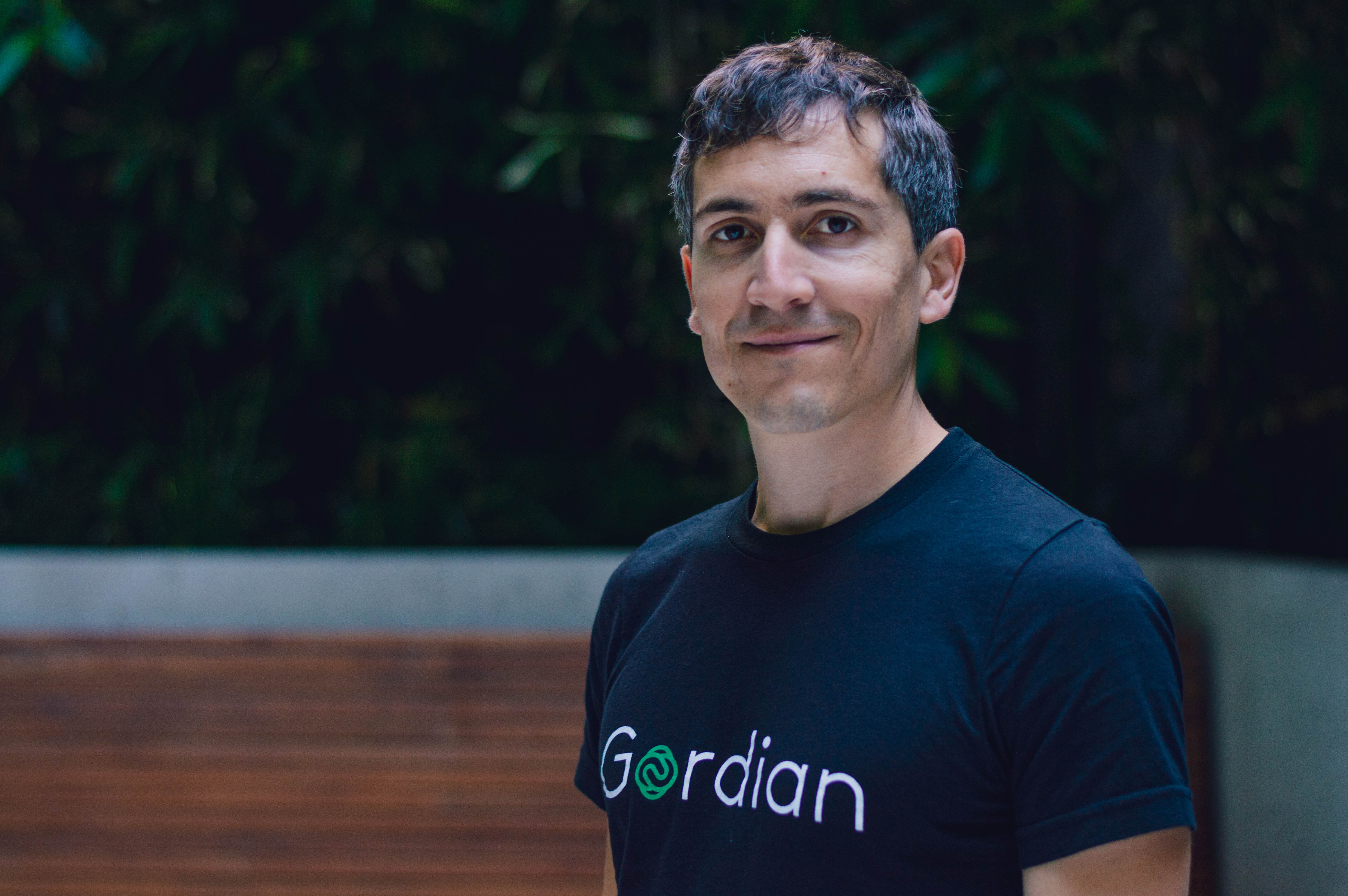Francisco LePort follows his theme

LePort's curiosity once took him to the deserts of Nevada where he blew up car batteries.
Themes can emerge again and again in the story of a career. But there’s always a central theme that defines the themes that come later. For Francisco LePort, who graduated from the UCI Department of Physics & Astronomy in 2003, the theme that explains it all is “an intense curiosity about the physical world, combined with really being able to create something from that,” he said while sitting in the driver’s seat of his car while on the side of a busy street somewhere in the San Francisco Bay Area. “From early on, I wanted to understand how the world worked on a deep, fundamental level.”
An empty car seat sat in the back of LePort’s car, and he sported a brown shirt with a single word printed on it: Gordian. It’s the name of LePort’s startup — his curiosity’s latest creation. It’s a biotech company that’s discovering gene therapies to treat age-related diseases.
But LePort’s theme was also there 21 years ago, when he was an undergrad at UCI and he was a physics major working in the lab of Professor Roger McWilliams. It was his first stint in a physics lab, and he remembers he and McWilliams doing an experiment involving chunks of metal and blasting them with lasers. The two didn’t have a purpose in mind for the experiment — they did it “just because we could,” like musicians playing whatever notes come to mind without a set arrangement, so they could see “if something really, really cool might happen,” LePort said. “There would just be this gleam in in his eyes,” LePort recalled of McWilliams. “‘Look how cool this is!’”
After UCI, LePort went to Stanford to get his Ph.D., where he built a “neutrino detector from scratch,” he said. That’s like saying you built a magnifying glass with enough oomph to it that it can see individual atoms. Only harder, because LePort’s magnifying glass could see particles even smaller than atoms: neutrinos, which, as the most abundant subatomic particle in the Universe, are part of what help stars burn.
In building that neutrino detector, LePort continued a UCI tradition, or theme, that Fred Reines, the former dean of Physical Sciences, who co-discovered the neutrino back in 1956, embodied. The tradition continues to this day in the form of another new detector, FASER, which, designed and built at UCI by a team led by Jonathan Feng and Dave Casper in Physics & Astronomy, is set to start detecting both neutrinos and also evidence for dark matter — the most abundant matter in the Universe that no one’s even seen before — in the next year or so.
During LePort's neutrino research, however, a colleague told him something. “Somebody said that if you continue down this path, you’ll do maybe three big experiments in your life,” LePort said. “To me, that spoke to this desire to do something — to discover something more quickly.”
That’s why LePort left academia in 2010 and joined a startup that had only recently gone public: Tesla, the electric car company. “At that point it was all about: Can we build a battery system that’s safe?” To find out, LePort went with his team to the deserts of Nevada, where they pushed Tesla car batteries to their utmost limits until they exploded. What makes a battery explode is an important issue as the transportation industry continues to electrify. Much of his work ended up in the battery pack of the Model S just before that car’s debut, and has defined Tesla’s vehicle safety record ever since.
Tesla gave LePort the chance to “really see the way a really good startup could be run,” he said. It was the simple clarity of that company’s vision, he explained, that he took with him when he left in 2013. He left because, he said, “I felt this itch growing. I wanted to be involved with something from the ground up.”
So he went to the place where things grow from the ground up: start-ups.
Later in 2013, he found himself standing in front of a nondescript building somewhere in San Francisco’s Mission District. He thought he was in the wrong place. Like a circus that emerges from nowhere overnight, the offices of Integrated Plasmonics Corporation were just a couple of lab benches and a clean room standing in the middle of a warehouse. The aim of the company, LePort explained, was to create a way for you to, at your desk at home or at work, have your blood drawn and tested. It sounded like a cool idea, but the company, again like a circus, folded and returned to nowhere. It floundered, LePort thinks, because they lacked an explicit vision of what the product they wanted to create actually was. “It didn’t achieve clear direction on what they wanted to product to be,” he said.
With that experience and the clarity he saw at Tesla, both wrapped around his curiosity of the fundamental, LePort founded Gordian Biotechnology in 2018. Gordian grew from work that LePort’s mother does as a primary care physician treating the elderly, and from the work of a UCI professor Michael Rose who studies the aging process in fruit flies. The idea behind Gordian, LePort explained, is to identify genes involved in age-related diseases with the eventual aim of developing gene therapies for those diseases. Gordian’s already developed technology that allows simultaneous screening of hundreds of genetic therapies in a single aged, diseased animal, and recently demonstrated an ability to predict certain clinical outcomes for the therapies.
Be it genes or neutrinos, blowing up batteries or navigating the human genome, the chapters of LePort’s story seem to stem from the essential curiosity that was there when he blasted metal with lasers alongside an eyes-a-glow McWilliams.
The rest feel like details.
